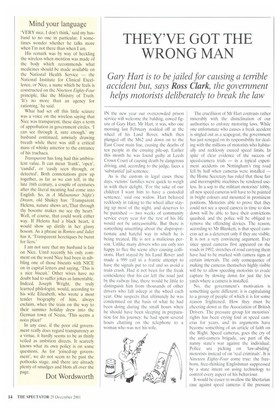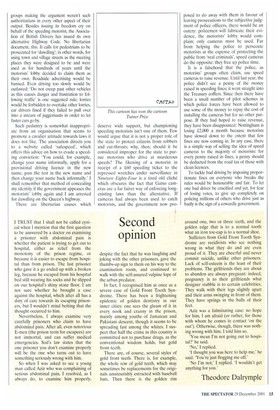THEY'VE GOT THE WRONG MAN
Gary Hart is to be jailed for causing a terrible
accident but, says Ross Clark, the government
helps motorists deliberately to break the law
IN the new year our overcrowded prison service will welcome the balding, cowed figure of Gary Hart. Mr Hart, it was, who one morning last February nodded off at the wheel of his Land Rover, which then plunged off the M62 and down on to the East Coast main line, causing the deaths of ten people in the ensuing pile-up. Earlier this month he was found guilty at Leeds Crown Court of causing death by dangerous driving, and, according to the judge, faces a 'substantial' jail sentence.
As is the custom in legal cases these days, victims' families were quick to weigh in with their delight. 'For the sake of our children I want him to have a custodial sentence,' said one widow. Hart behaved recklessly in taking to the wheel after staying up most of the night, and deserves to be punished — two weeks of community service every year for the rest of his life would not be unreasonable. But there is something unsettling about the disproportionate and hateful way in which he is being treated. He is not a malicious person. Unlike many drivers who are only too happy to flee the scene after causing collisions, Hart stayed by his Land Rover and made a 999 call in a frantic attempt to have the signals put to red and so avoid a train crash. Had it not been for the freak coincidence that his car left the road just by the railway line, there would be little to distinguish him from thousands of other drivers who fall asleep at the wheel each year. One suspects that ultimately he was condemned on the basis of what he had been doing during the small hours when he should have been sleeping in preparation for his journey: he had spent several hours chatting on the telephone to a woman who was not his wife.
The crucifixion of Mr Hart contrasts rather miserably with the disinclination of our authorities to enforce motoring laws. While one unfortunate who causes a freak accident is singled out as a scapegoat, the government has just reneged on its responsibility for dealing with the millions of motorists who habitually and recklessly exceed speed limits. In spite of clear evidence of the success of speed-camera trials — in a typical experiment accidents on Nottingham's ring road fell by half when cameras were installed — the Home Secretary has ruled that these fair and incorruptible machines be rendered useless. In a sop to the militant motorists' lobby, all new speed cameras will have to be painted in bright colours and mounted in prominent positions. Motorists able to prove that they could not see a speed camera in time to slow down will be able to have their convictions quashed. and the police will be obliged to remove the offending devices. The reason, according to Mr Blunkett, is that speed cameras act as a deterrent only if they are visible. It is not a very convincing argument. Ever since speed cameras first appeared on the roads in 1992, stretches of road carrying them have had to be marked with camera signs at certain intervals. The only consequence of making the cameras themselves highly visible will be to allow speeding motorists to evade capture by slowing down for just the few yards where a camera is installed.
No, the government's motivation is something quite different: it is capitulating to a group of people of which it is for some reason frightened. How they must be cheering down at the Association of British Drivers. The pressure group for motorists' rights has been crying foul at speed cameras for years, and its arguments have become something of an article of faith on the Right. Speed cameras, goes the cry of the anti-camera brigade, are part of the nanny state's war against the individual. Police are picking on 'law-abiding' motorists instead of on 'real criminals'. It is Nineteen Eighty-Four come true: the freeborn, free-thinking Englishman suppressed by a state intent on using technology to control every aspect of his behaviour.
It would be easier to swallow the libertarian case against speed cameras if the pressure groups making the argument weren't such authoritarians in every other aspect of their output. Besides issuing its freedom cry on behalf of the speeding motorist, the Association of British Drivers has issued its own alternative Highway Code. No libertarian document, this. It calls for pedestrians to be prosecuted for dawdling'; in other words, for using town and village streets as the meeting places they were designed to be and were used as for hundreds of years until the motorists' lobby decided to claim them as their own. Roadside advertising would be banned. Even driving too slowly would be outlawed: 'Do not creep past other vehicles as this causes danger and frustration to following traffic' is one suggested rule; lorries would be forbidden to overtake other lorries, car drivers fined if they failed to pull over into a stream of juggernauts in order to let faster cars go by.
Such pedantry is somewhat inappropriate from an organisation that seems to promote a cavalier attitude towards laws it does not like. The association directs you to a website called `safespeed', which offers this advice on how to evade a speeding conviction: 'You could, for example, change your name informally, apply for a provisional driving licence in the new name, pass the test in the new name and then change your name back informally.' I shall remember that method of concealing my identity if the government appeases the motorists' lobby again and I am arrested for dawdling on the Queen's highway.
There are libertarian causes which
deserve wide support, but championing speeding motorists isn't one of them. Few would argue that it is not a proper role of the state to protect citizens from robbers and cut-throats; why, then, should it be considered improper for the state to pursue motorists who drive at murderous speeds? The likening of a motorist in receipt of a £60 speeding ticket to the repressed wretches under surveillance in Nineteen Eighty-Four is a tired old cliché which obscures the fact that Gatso cameras are a far fairer way of enforcing longexisting laws than the alternative. If cameras had always been used to catch motorists, and the government now pro
posed to do away with them in favour of leaving prosecutions to the subjective judgment of police officers, there would be an outcry: policemen will fabricate their evidence, the motorists' lobby would complain; only cameras must be used. Far from helping the police to persecute motorists at the expense of protecting the public from 'real criminals', speed cameras do the opposite; they free up police time.
It is a falsehood that the police, as motorists' groups often claim, use speed cameras to raise revenue. Until last year, the police didn't see a penny of the money raised in speeding fines; it went straight into the Treasury coffers. Since then there have been a small number of pilot schemes in which police forces have been allowed to use some of the money to repay the cost of installing the cameras but for no other purpose. If they had hoped to raise revenue, they have been disappointed: Nottingham is losing £2,000 a month because motorists have slowed down to the extent that few fines are now coming in. In any case, there is a simple way of selling the idea of speed cameras to the majority of motorists: for every penny raised in fines, a penny should be deducted from the road tax of those with clean licences.
To tackle bad driving by imposing proportionate fines on everyone who breaks the rules would be honourable and fair. To let one bad driver be crucified and yet, for fear of losing votes, to give up completely on policing millions of others who drive just as badly is the sign of a cowardly government.



























































 Previous page
Previous page